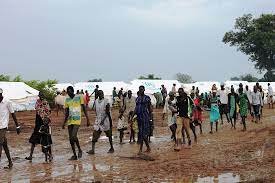UNHCR raising alarm of displacement as violence in eastern DR Congo increases
The deeply troubling trend of the increased use of heavy artillery in the conflict continues amid reports of bombings targeting civilian locations in Minova.

UNHCR, the UNHCR Refugee Agency, is raising the alarm as ongoing violence in eastern areas of the Democratic Republic of the Congo (DRC) reaches a devastating level.
Two years of cyclical conflict in the North Kivu territories of Rutshuru and Masisi have forced over 1.3 million people to flee their homes within the DRC, leading to a total of 5.7 million people becoming internally displaced across North Kivu, South Kivu and Ituri provinces.
Since violent clashes enveloped the town of Sake, in Masisi territory, on 7 February, almost 300,000 people have arrived in the city of Goma and its surroundings, swelling spontaneous and official displacement sites as they desperately seek shelter from indiscriminate bombing and other human rights abuses. Conditions are dire as growing needs for shelter, sanitation and livelihood solutions outstrip available resources. A further 85,000 people have fled the same violence and sought shelter in the Minova region of South Kivu. In January, the town of Minova already hosted over 156,000 displaced people, with the majority living in makeshift shelters.
The deeply troubling trend of the increased use of heavy artillery in the conflict continues amid reports of bombings targeting civilian locations in Minova. The shelling of a commercial centre on 20 March killed a displaced woman and injured at least three others, including two children. Reports of indiscriminate bombings in Sake and Goma over recent weeks, which killed more than 30 people and injured at least 80, are also concerning, as is the threat of unexploded ordnance. UNHCR emphasizes the imperative of safeguarding civilians and upholding the civilian and humanitarian nature of displacement sites.
The latest reports from UNHCR teams are alarming. Families continue arriving at sites traumatized and exhausted by the attacks, scarred physically and psychologically. Many report being abused – some sexually – during their flight. New arrivals find refuge in makeshift shelters in overcrowded sites, in schools and churches, or with host families, stretching their meagre resources.
Worryingly, humanitarian partners have observed systematic incursions by armed groups into civilian structures like displacement sites, hospitals and health centres. In 2023, 25 schools were occupied by non-state armed groups in Masisi and Rutshuru territories alone, and a further 17 schools were attacked. In 2024, seven schools were destroyed by bombings. Looting of medicines and essential materials from health centres in recent weeks further hampered humanitarians’ ability to support displaced people. Hundreds of thousands have been identified as displaced behind frontlines in Masisi, Rutshuru and Nyiragongo territories, cut off from aid.
The renewed violence means many children have been displaced, and a large number are now unaccompanied and exposed to grave risks and violations, including kidnapping, forced recruitment, mutilation and rape. In 2023, in North Kivu alone, there were 50,159 reported cases of gender-based violence, more than half of which were rape; 90 per cent of these victims were women and girls, while 37 per cent were children. UNHCR’s assistance to survivors of sexual abuse includes psychosocial support and referral to medical assistance, as well as work with displaced men.
As the violence continues and humanitarian access is further hindered, risks for displaced and civilian populations are multiplying. UNHCR is calling for an immediate end to the violence and urges all parties to the conflict to respect and uphold international humanitarian law and human rights, and to protect civilians.
A scaled-up humanitarian response in the eastern provinces between June and December 2023 reached more than 3.1 million people with life-saving assistance. UNHCR, with partners, provided emergency shelter to over 40,000 of the most vulnerable arrivals in Goma. The distribution of over 3,600 core relief item kits and 1,000 tarpaulins helped improve daily life for those outside planned sites. But this addressed only a small portion of those in desperate need.
UNHCR remains deeply committed to supporting those affected in eastern DRC and urgently calls for concerted international action to address the crisis. UNHCR has received only 14 per cent of the $250 million required for its response in the DRC in 2024. The lack of funding threatens aid deliveries, exacerbating the region’s dire humanitarian crisis.
- READ MORE ON:
- UNHCR
- Democratic Republic of the Congo










